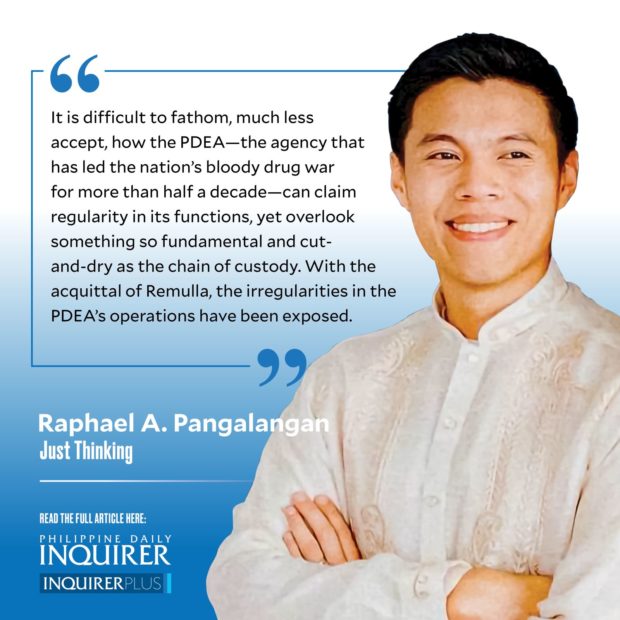‘In dubio pro reo’
In People v. Juanito D. Remulla III (Crime Case No. 22-1176), two presumptions met at an impasse. On one side was the presumption of innocence and, on the other, the presumption of regularity.
Both presumptions may be described as doctrines of deference. The presumption of innocence yields in favor of the criminally accused—in this case, Remulla—and is captured by the titular Latin maxim “in dubio pro reo” (“in cases of doubt, then for the accused”). A product of US colonial influence, the common law presumption requires the guilt of the accused to be established beyond reasonable doubt. More than mere judicial design, the presumption of innocence is codified in no less than Article III, Section 14 of the Philippine Constitution. Subparagraph 2 thereof reads: “In all criminal prosecutions, the accused shall be presumed innocent until the contrary is proved[.]”
The second presumption, on the other hand, is a deference doctrine in a much different way. Created by the courts of law (likewise a relic of our colonial past), the presumption of regularity credits to state agents—in this case, the Philippine Drug Enforcement Agency (PDEA)—the benefit of doubt. In the absence of affirmative evidence to the contrary, the PDEA is assumed to have performed its duties in the manner prescribed by law.
(For my legal readers: Interestingly, in the US, the presumption of regularity is treated as a facet of the political question doctrine. It is a form of judicial restraint by which the court of law stays its hand and yields to executive will. This is in contrast to the Philippine Supreme Court’s interpretation, which defines the presumption as “an aid to the effective and unhampered administration of government functions.” (Yap v. Lagtapon, GR No. 196347). Here, therefore, the presumption of regularity is in large-part appreciated for its practical rather than its principled nuance.)
For the past seven years, the PDEA and Philippine National Police have hidden behind the cloak regularity’s surmise. In the face of tens of thousands of killings, government officials have invoked the presumption of regularity in operational conduct to parry the need for investigation in and prosecution of the extrajudicial killings in the nation’s drug war.
Not anymore!
In the Jan. 6, 2023 decision of Regional Trial Court (RTC) Branch 197, Remulla was acquitted on two grounds: (i) the prosecution’s failure to “clearly prove the existence of animus possidendi (intent to possess the illegal drugs) on the part of the accused,” and (ii) lapses in the chain of custody. For the latter, the RTC ruled: “The prosecution must establish that the drugs presented in court as evidence are the exact same drugs seized from the accused and examined by the crime laboratory.”
Perhaps it is of little use bickering over the first ground, as, in the end, it would be all for naught. Had the prosecution indeed established the presence of animus possidendi, the mishandling of evidence alone would very well constitute “reasonable doubt” that would merit an acquittal. All it takes is one weak link in the chain of custody and, poof, Remulla walks away a free man. As indeed he did.
But here’s the rub: This is not simply a case of finding a weak link in the custodial chain. On the contrary, in People v. Remulla III, the entire chain was missing! The RTC observed that from Oct. 4, 2022—the time the drugs were first detected in transit—up to the time the drugs were presented in court, the “records are devoid of any details regarding the custody of the dangerous drugs”!!!
It is difficult to fathom, much less accept, how the PDEA—the agency that has led the nation’s bloody drug war for more than half a decade—can claim regularity in its functions, yet overlook something so fundamental and cut-and-dry as the chain of custody. With the acquittal of Remulla, the irregularities in the PDEA’s operations have been exposed.
Critics think that in acquitting Remulla, the court was too quick and sympathetic. I disagree. On the contrary, in the face of reasonable doubt, the court did what it was supposed to do! It held the presumption of innocence paramount to the presumption of regularity, and in line with the right of the accused to a speedy trial. If anything, it is the prosecutor to blame, who, in failing to present the custodial chain, made it all too easy for the court to rule in Remulla’s favor.
Of course, there is no ignoring the elephant in the room. In a sea of cases drawn out and corpses rubbed out, in People v. Remulla III, the court miraculously upheld legal standards for the son of the Secretary of Justice. But due process and the presumption of innocence are not the exception but the rule.
May Remulla’s acquittal be the standard for all future cases. May it serve as a reminder to the PDEA, the PNP, to the courts of law, and the country writ large of the high standards enshrined in our Constitution. Of the fundamental rights not only available to Remulla, but available to all.
—————–
thinkjustly@gmail.com





















